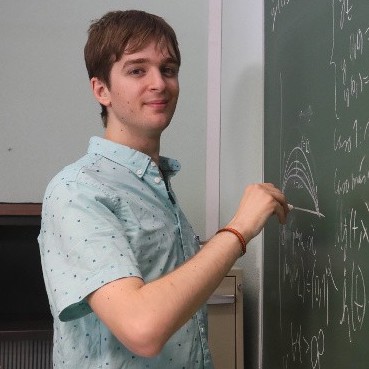In the RSME's 7th Congress of Young Researchers, there will be seven plenary talks by mathematicians of national and international prestige. The plenary talks will be in English. Each of the plenaries is named after the seven streets of the Casco Viejo of Bilbao.
Goienkale Plenary Talk
Monday 13, 11:30
[Mitxelena Auditorium in the Bizkaia Aretoa]
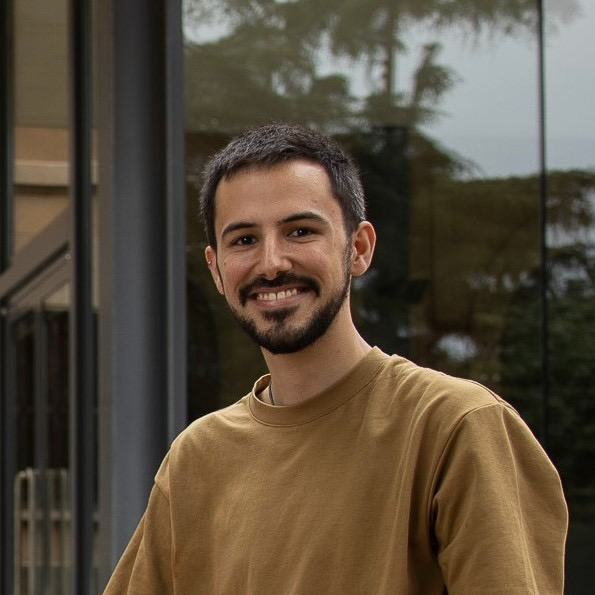
©2023 FBBVA
Robert Cardona
(Universitat de Barcelona)
Specialist in contact symplectic geometry and topology, with emphasis in the interaction of these fields with conservative dynamics and hydrodynamics.
Profesor Lector at Universitat de Barcelona, from 2023. Vicent Caselles Award 2023; and Évariste Galois Award 2019. Postdoctoral Researcher at Instituto de Ciencias Matemáticas, 2022-2023. Postdoctoral Researcher at Université de Strasbourg (France), 2021-2022. PhD from Universitat Politècnica de Catalunya (UPC), 2021; Máster en Matemática Avanzada e Ingeniería Matemáticafrom UPC, 2018; and Grado en Matemáticas from UPC, 2017.
Symplectic topology, dynamics, and ideal fluids
Originating in the works of Poincaré at the end of the XIX century, dynamical systems and symplectic (and contact) topology are two disciplines of mathematics that first developed in a rather independent way. In the last two decades, "Symplectic dynamics" has become a flourishing new field on its own that integrates ideas of these two classical disciplines. In this talk, we first give an accessible overview of some ideas and recent developments in this theory. We will explore its connections to hydrodynamics, and propose a new framework that links contact topology and symplectic dynamics to the study of the time-dependent Euler equations for ideal fluid motion on three-manifolds. The latter is based on joint work with Francisco Torres de Lizaur.
Códigos MSC: 57K43; 57K33; 37J06; 35Q31
Artekale Plenary Talk
Tuesday 14, 9:30
[Great Hall of the UPV/EHU]
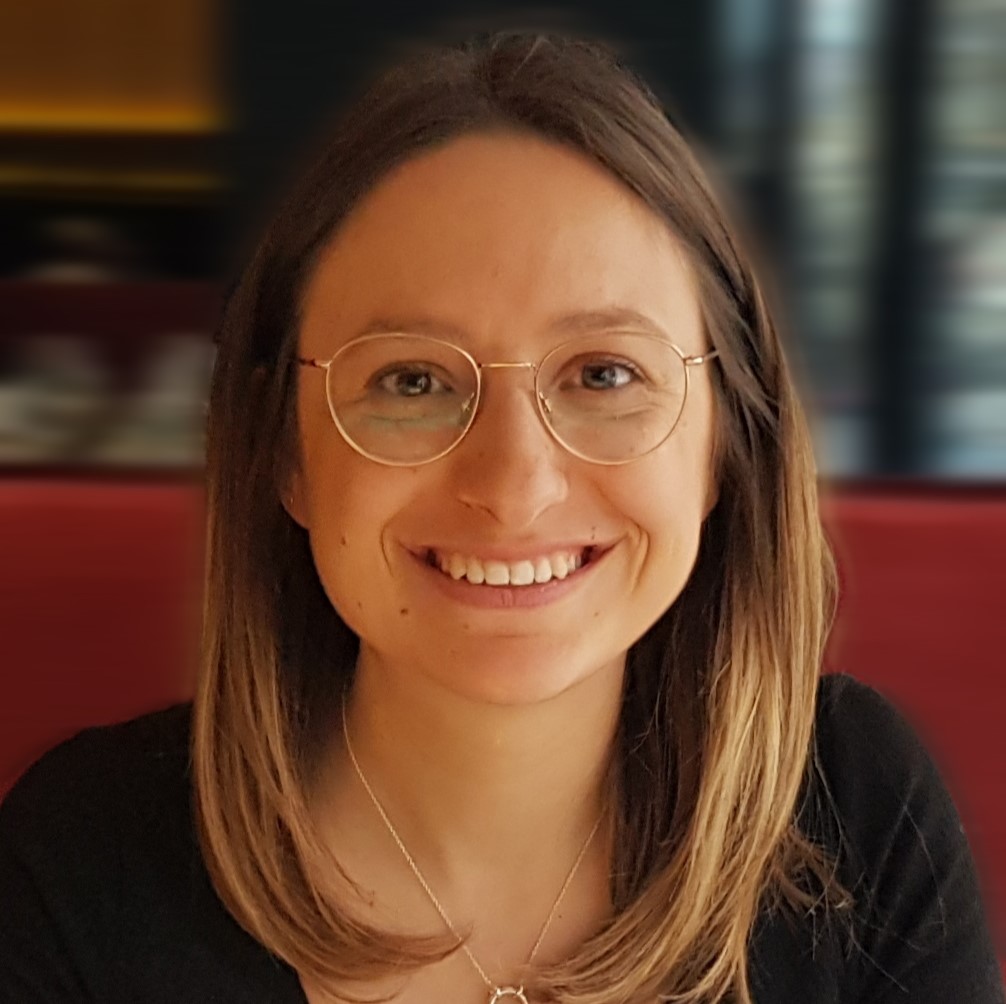
©2023 Marina Leal Palazón
Marina Leal Palazón
(Universidad Miguel Hernández)
Specialist in operations research, with special interest on mixed integer programming.
Profesora Ayudante Doctora at Universidad Miguel Hernández de Elche and Investigadora in the CIO Institute from that university, from 2020. Postdoctoral Researcher at Universität Trier (Germany), 2019-2020. PhD from Universidad de Sevilla, 2019, with Extraordinary Award; Máster en Matemática Avanzada from Universidad de Murcia, 2014; and Licenciatura en Matemáticas from Universidad de Alicante, 2013.
Mathematical Optimization for Unsupervised Learning
in a Data‑Driven World
Decision-making is present in many areas such as location, planning, network design, finance, transport, and more. Making good decisions (ideally, the best ones) is crucial in these fields. In decision processes, Operations Research (OR) offers the theories and tools needed to make better decisions. Among all the theories in OR, Mathematical Optimization leads to optimal choices. Since we live in a data-driven world, many decisions today involve the use of data. Clustering is a data analysis technique used to identify groups or clusters within a dataset, serving as a key tool to facilitate the decision-making process in various areas. Hierarchical clustering is a clustering method that builds a hierarchy of groups. It groups data points into a nested tree of clusters, which is visualized as a dendrogram. Different definitions of the distance between two clusters (known as linkages) lead to different dendrograms. Dendrograms are constructed by running iterative greedy algorithms.
In this talk, three optimization models for hierarchical clustering will be considered. First, the problem of Feature Selection in Single-Linkage Clustering is addressed via Mixed Integer Linear Programming (MILP) formulations. Second, MILP approaches will be developed for computing the purity of a dendrogram. Purity is a measure of the quality of clustering that can be calculated when observations in the data are labeled; it allows for comparing dendrograms. Finally, we will present a formulation for Complete-Linkage clustering.
Códigos MSC: 90C05; 90C11; 90C46
Dendarikale Plenary Talk
Wednesday 15, 9:00
[Mitxelena Auditorium in the Bizkaia Aretoa]
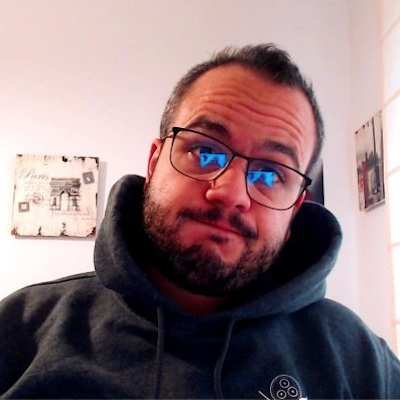
©2022 Javier Álvarez Liébana
Javier Álvarez Liébana
(Universidad Complutense de Madrid)
Specialist in statistics, with emphasis on temporal series and dunctional data analysis.
Profesor Ayudante Doctor at Universidad Complutense de Madrid (UCM), from 2021, being R adviser and educator for RTVE. Analyst and Advisor of Dirección General de Salud Pública de Asturias, 2020-21. Profesor Sustituto Ayudante Doctor at Universidad de Oviedo, 2018-2021, with the fellowship Juan de la Cierva Formación. PhD at Universidad de Granada, 2018; Máster en Ingeniería Matemática at UCM, 2014; and Licenciatura en Matemáticas at UCM, 2013.
Biases, fallacies and other statistical creatures
Statistics play a much greater role in our lives than we often realize, especially in the functioning of a democracy. Why are most political leaders born in the early months of the year? What do political campaigns have in common with World War II and traffic accidents? How can a lottery decide your fate in a war? Why was counting taxis crucial for political parties before modern technology? What are the most common errors in conducting phone surveys? How do chance and uncertainty shape our lives? This plenary talk will explore some of the most frequent statistical biases and fallacies that affect us daily.
Belostikale Plenary Talk
Wednesday 15, 10:30
[Mitxelena Auditorium in the Bizkaia Aretoa]
Jon Asier Bárcena‑Petisco
(UPV/EHU)
Specialist in differential equations, with special attention to controllability and observability.
Assistant Professor at UPV/EHU, since 2021. Vicent Caselles Award 2021. Postdoc at Universidad Autónoma de Madrid, 2020-2021. PhD from Sorbonne Université (France), 2020; Master1 Mathématiques and Master2 Mathématiques et applications from Sorbonne Université (France), 2016 y 2017; and Grado en Matemáticas from UPV/EHU, 2016.
Controllability of the heat equation in Lipschitz domains
The heat equation is the most basic parabolic PDE. Its null controllability was proved in the 90s for all $C^2$ domains by Fursikov and Imanuvilov. However, this problem still remains open in arbitrary Lipschitz domains. In this talk, first, we introduce the notions of controllability and observability, and show that they are dual concepts. Secondly, we present the classical techniques used on the controllability of the heat equation for $C^2$ domains. Finally, we discuss the recent controllability results of the heat equation for domains that are not $C^2$. All this is done in an elementary way, just requiring some basic knowledge on Mathematical Analysis.
Códigos MSC: 93-02; 93C20; 35K05
Harategi Zahar Kalea Plenary Talk
Thursday 16, 9:00
[Great Hall of the UPV/EHU]
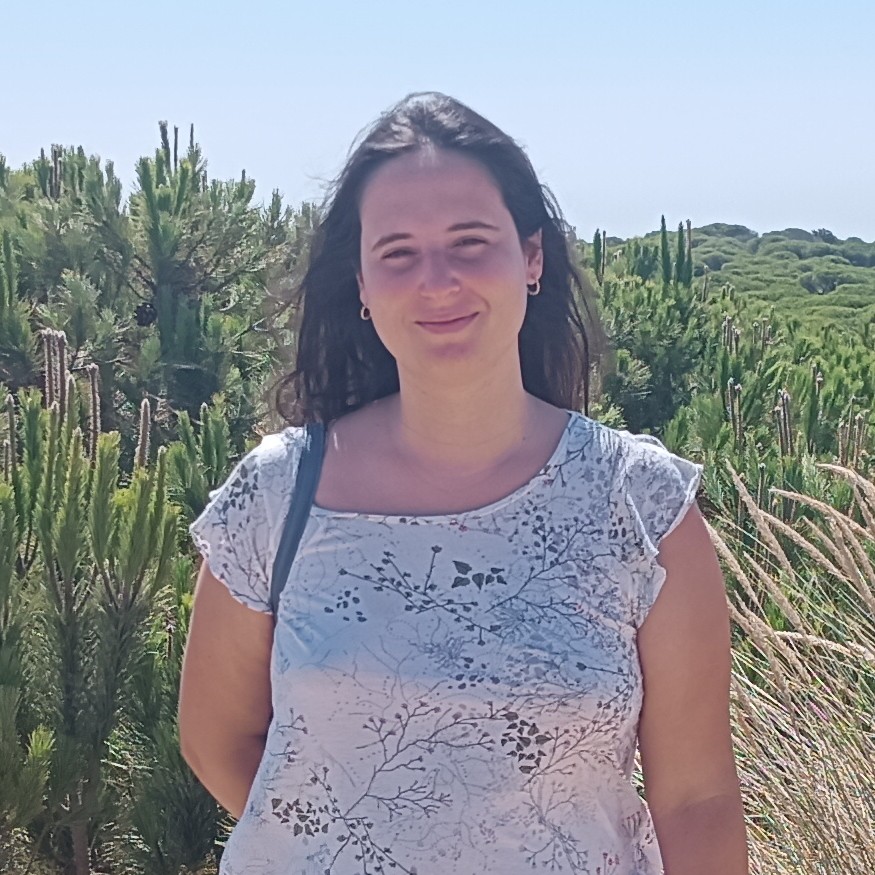
©2023 Ana Cabello Pastor
María Cumplido
(Universidad de Sevilla)
Specialist in group theory, specially braid and Artin groups with emphasis on combinatorial and geometric methods.
Investigadora Ramón y Cajal at Universidad de Sevilla (US) from 2022 [December], being co-main researcher of the project "Geometric groups theory: From Cremona groups to braid groups". Vicent Caselles Award 2020. Postdoctoral Researcher at US, 2021 [February]-2022 [November]. Profesora Ayudante Doctora at Universidad Complutense de Madrid, 2021 [September]-2022 [January]. Postdoctoral Researcher at Herior-Watt University (Canada), 2019-2020. Postdoctoral Researcher at Université de Bourgogne, 2018-2019. PhD from Université de Rennes 1 (France) and US, 2018 [September], with 2e prix de thèse 2018 from the Fondation Rennes 1 in Mathematics and Information Technology; Máster en Matemática Avanzada from US, 2015; and Grado en Matemáticas from US, 2014.
Braids, curves and parabolic subgroups
The aim of this talk is to explain and motivate the central objects of my research: parabolic subgroups. Braids are versatile objects, as they have both topological and purely algebraic descriptions. With the topological definition, we find generalizations such as mapping class groups, while with the algebraic definition, the most important generalization is Artin groups. Very little is known about Artin groups (the classic Dehn problems remain open in general). One approach to learning more is to see how topological strategies, such as the action of the braid group on the curve complex of a surface, can be translated into the algebraic context. In this situation, the algebraic analogs of curves are precisely parabolic subgroups. During the talk, we will discuss the main open questions about these subgroups and the different strategies available to tackle them.
Barrenkale Plenary Talk
Thursday 16, 15:00
[Great Hall of the UPV/EHU]
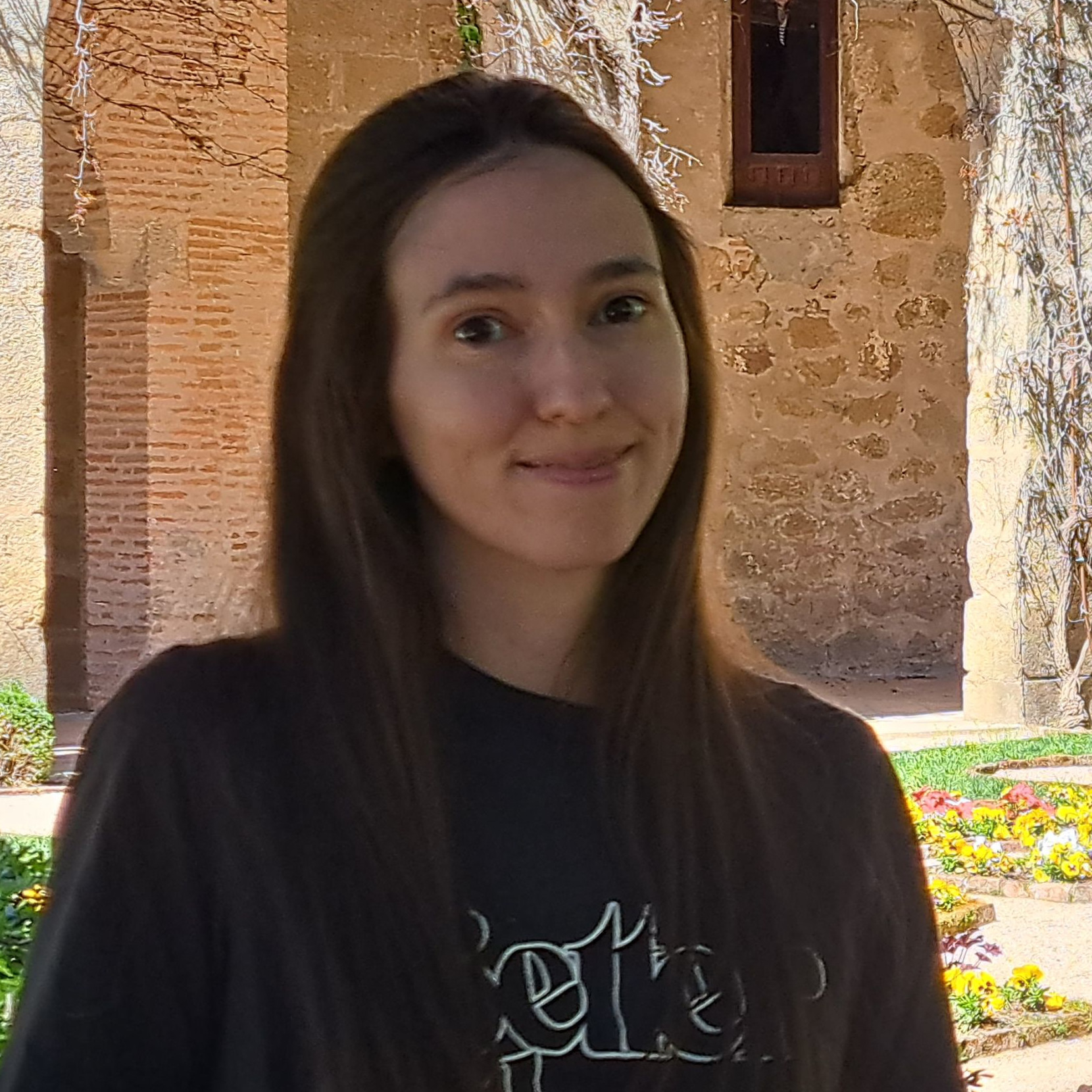
©2023 Francisco Penedo Álvarez
María Inés de Frutos Fernández
(University of Bonn)
Specialist in mathematical formalization and algebraic number theory.
Investigadora Postdoctoral en la University of Bonn, desde 2024. Postdoctoral Researcher Margarita Salas at Universidad Autónoma de Madrid (UAM), 2023 [February]-2024. Research Associate at Imperial College London (United Kingdom), 2021 [August]-2023 [February]. Profesora Ayudante Doctora at Universidad Nebrija, 2021 [April-August]. PhD from Boston University (BU) (Massachusetts, USA), 2020 [May]; MA in Mathematics from BU, 2018; and Doble Grado en Matemáticas e Ingeniería Informática from UAM, 2014, with Honorific Mention.
Formalization of number theory in Lean
Mathematical formalization consists of digitizing mathematical definitions and results using a "proof assistant", a computer program capable of checking whether a proposition can be deduced from a set of inference rules and a collection of basic axioms. In recent years, the community of mathematicians working on formalization has grown rapidly and has reached milestones that demonstrate the ability to formalize results at the frontier of knowledge. Proof assistants have applications to mathematics research, teaching, and communication.
After a brief introduction to formalization, I will present several of my number theory formalization results in the Lean interactive proof assistant, from sub-areas that include class field theory, p-adic Hodge theory, and the theory of Drinfeld modules.
Códigos MSC: 68V20; 68V15; 11-XX
Barrenkale Barrena Plenary Talk
Friday 17, 11:30
[Great Hall of the UPV/EHU]
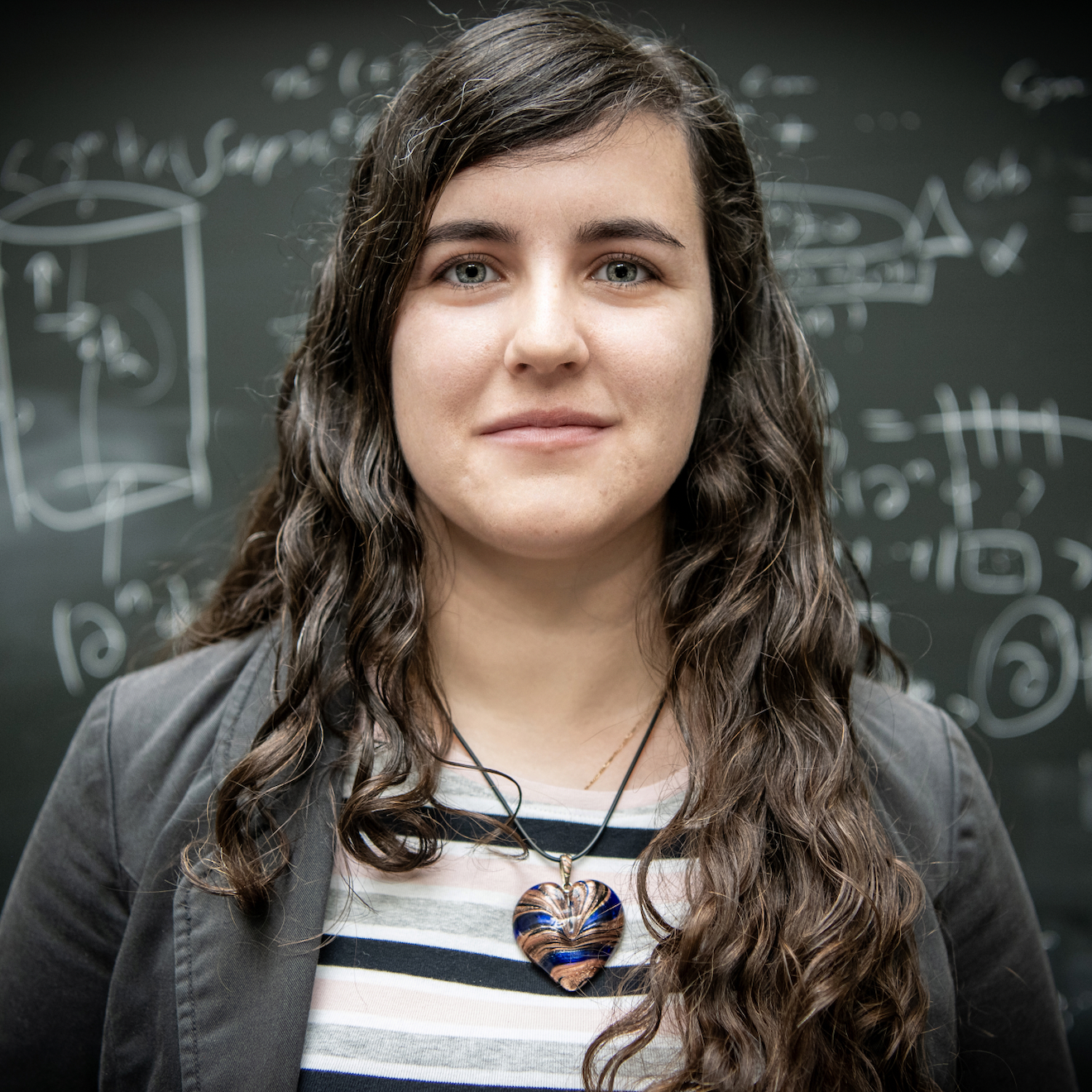
©2023 Perimeter Institute
Ángela Capel
(University of Cambridge)
Specialist in quantum information theory and in mathematical physics.
Assistant Professor at University of Cambridge (United Kingdom), from 2024. Member of the List Forbes 30 under 30 Spain 2023; and Vicent Caselles Award 2022. Junior Professor at Universität Tübingen (Germany), 2021-2024. Simons Emmy Noether Fellow at Perimeter Institute for Theoretical Physics (Canada), 2023. MCQST Distinguished Postdoc at Technische Universität München (Germany), 2020-2021. PhD from Universidad Autónoma de Madrid (UAM), 2019, with the scholarship La Caixa-Severo Ochoa from Instituto de Ciencias Matemáticas (ICMAT); Máster en Matematicas y Aplicaciones from UAM, 2015; and Licenciatura en Matemáticas from Universidad de Granada, 2014.
Thermalization of open quantum many‑body systems
A dissipative evolution of an open quantum many-body system weakly coupled to a thermal bath can be modelled by a quantum Markov semigroup, and its mixing time can be bounded using optimal constants of certain quantum functional inequalities, such as the modified logarithmic Sobolev constant. In this talk, we will review the mathematical formalism of dissipative evolutions governed by Lindbladians, and we will summarize the current state of the art on mixing times when the system has an associated commuting Hamiltonian.
Códigos MSC: 47N50; 39B62; 15A90
